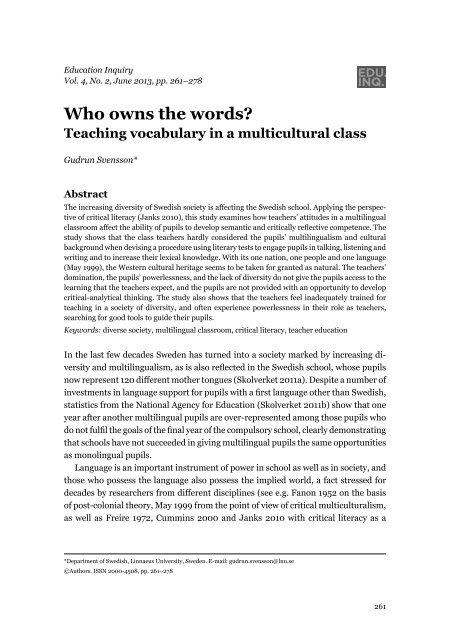Download issue - Umeå universitet
Download issue - Umeå universitet
Download issue - Umeå universitet
You also want an ePaper? Increase the reach of your titles
YUMPU automatically turns print PDFs into web optimized ePapers that Google loves.
Education Inquiry<br />
Vol. 4, No. 2, June 2013, pp. 261–278<br />
EDU.<br />
INQ.<br />
Who owns the words?<br />
Teaching vocabulary in a multicultural class<br />
Gudrun Svensson*<br />
Abstract<br />
The increasing diversity of Swedish society is affecting the Swedish school. Applying the perspective<br />
of critical literacy (Janks 2010), this study examines how teachers’ attitudes in a multilingual<br />
classroom affect the ability of pupils to develop semantic and critically reflective competence. The<br />
study shows that the class teachers hardly considered the pupils’ multilingualism and cultural<br />
background when devising a procedure using literary tests to engage pupils in talking, listening and<br />
writing and to increase their lexical knowledge. With its one nation, one people and one language<br />
(May 1999), the Western cultural heritage seems to be taken for granted as natural. The teachers’<br />
domination, the pupils’ powerlessness, and the lack of diversity do not give the pupils access to the<br />
learning that the teachers expect, and the pupils are not provided with an opportunity to develop<br />
critical-analytical thinking. The study also shows that the teachers feel inadequately trained for<br />
teaching in a society of diversity, and often experience powerlessness in their role as teachers,<br />
searching for good tools to guide their pupils.<br />
Keywords: diverse society, multilingual classroom, critical literacy, teacher education<br />
In the last few decades Sweden has turned into a society marked by increasing diversity<br />
and multilingualism, as is also reflected in the Swedish school, whose pupils<br />
now represent 120 different mother tongues (Skolverket 2011a). Despite a number of<br />
investments in language support for pupils with a first language other than Swedish,<br />
statistics from the National Agency for Education (Skolverket 2011b) show that one<br />
year after another multilingual pupils are over-represented among those pupils who<br />
do not fulfil the goals of the final year of the compulsory school, clearly demonstrating<br />
that schools have not succeeded in giving multilingual pupils the same opportunities<br />
as monolingual pupils.<br />
Language is an important instrument of power in school as well as in society, and<br />
those who possess the language also possess the implied world, a fact stressed for<br />
decades by researchers from different disciplines (see e.g. Fanon 1952 on the basis<br />
of post-colonial theory, May 1999 from the point of view of critical multiculturalism,<br />
as well as Freire 1972, Cummins 2000 and Janks 2010 with critical literacy as a<br />
*Department of Swedish, Linnaeus University, Sweden. E-mail: gudrun.svensson@lnu.se<br />
©Authors. ISSN 2000-4508, pp. 261–278<br />
261

















